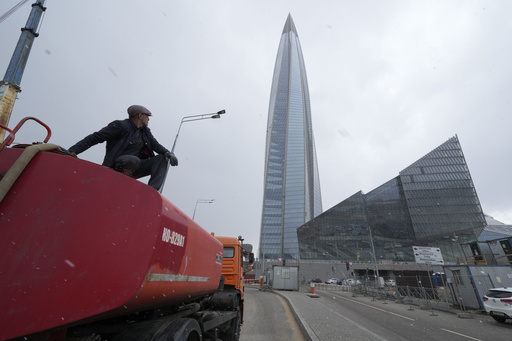Russia’s state-run energy corporation Gazprom announced on Saturday that it will stop gas deliveries to Moldova beginning January 1, attributing the decision to claims of unpaid debts by the European Union candidate nation. As a result of this impending cutoff, Moldova has begun implementing emergency strategies in anticipation of potential power shortages.
In a statement posted online, Gazprom indicated that it reserves the right to take additional measures, which could include terminating its agreement with Moldovagaz, the principal gas distributor in Moldova, where Gazprom holds a majority share. The halt in supplies will affect the Kuciurgan power station, the nation’s largest electricity producer, located in the separatist region of Transnistria that is aligned with Russia.
Moldova’s government reacted swiftly, accusing Moscow of manipulating its energy resources as a weapon against the country. Gazprom is responsible for the gas used by the Kuciurgan plant, which supplies energy to a large part of Moldova. The plant was privatized in 2004 under the direction of Transnistrian leaders and was subsequently sold to a Russian state-owned entity. However, Moldova, which has a government that favors Western alignment and reported consistent Russian interference, does not acknowledge the legitimacy of this privatization.
In light of these developments, Moldova’s parliament recently approved a state of emergency in the energy sector, driven by concerns that Russia may leave the nation without adequate energy supplies during the winter months. Furthermore, a dedicated commission has been established to assess “imminent risks” associated with Moscow’s potential failure to deliver gas to the Kuciurgan facility, and a series of energy-saving initiatives were approved on Friday.
Gazprom has claimed that Moldova owes approximately $709 million for previous gas deliveries, a figure that the Moldovan government vehemently contests. Prime Minister Dorin Recean responded to Gazprom’s statement on Saturday, asserting that the debt in question has been deemed invalid by an international audit. Moldova’s findings, as corroborated by British and Norwegian audit firms, suggest that the actual debt amounts to roughly $8.6 million, a tiny fraction of what Gazprom claims.
Recean emphasized that Moldova is actively seeking to diversify its natural gas sources to lessen its reliance on the Kuciurgan plant. He also indicated that the government would explore legal avenues, including the possibility of international arbitration, to safeguard the country’s interests. “Our nation is ready to face any challenges arising from the Kremlin’s actions,” he stated.
In a proactive move, Moldova’s government has laid out plans starting January 1 to curtail energy consumption. These measures include reducing lighting in public and commercial spaces by at least 30%, as well as scheduling energy-intensive operations during off-peak hours.
Moldova experienced significant power outages during late 2022, a consequence of Russian attacks on Ukraine, which is connected to the Kuciurgan power station. Transnistria, which declared independence following a brief conflict in 1992 and lacks broad international recognition, also instituted its own state of emergency earlier this month as a precaution against possible gas supply disruptions.
Since the full-scale invasion of Ukraine by Russia in 2022, Moldova—a former Soviet republic with a population of approximately 2.5 million—has worked diligently to diversify its energy portfolio, moving away from total dependence on Russian gas. In October, Moldova’s pro-Western President Maia Sandu secured a second term, and a referendum showed support for the country’s aspirations to join the EU, amid concerns of Russian efforts to undermine Moldova’s westward orientation. The Kremlin has denied any interference.
In 2022, Russia significantly reduced gas supplies to Europe, citing payment disputes which European leaders labeled as acts of energy coercion in response to their backing of Ukraine against Russia’s aggression. European nations were compelled to seek alternative energy sources, often at increased prices, much of which involved liquefied natural gas imported by ship from the United States and Qatar.



